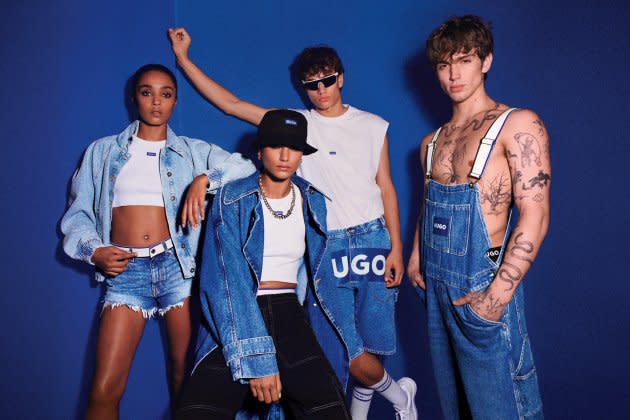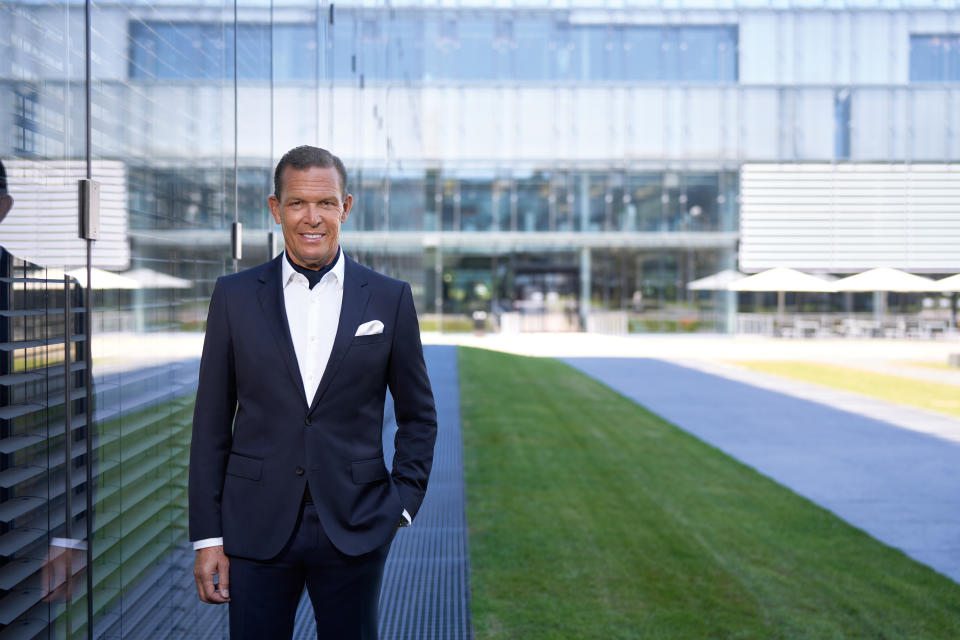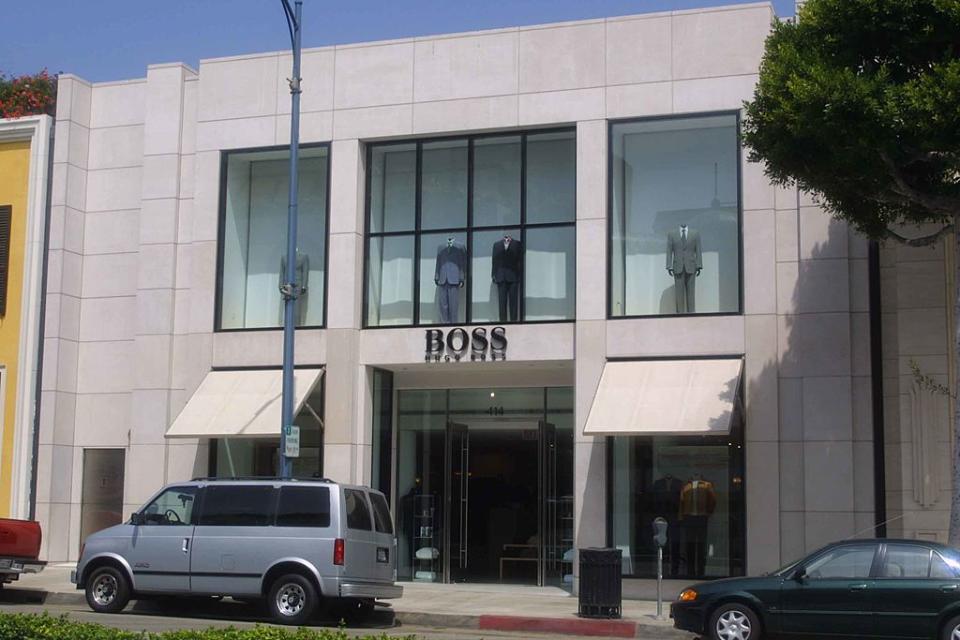Despite 2023 Results, Hugo Boss Urges Caution and Shares Plunge

This story has been updated.
Despite coming in on target for 2023 and having raised guidance twice last year, Hugo Boss will proceed much more cautiously this year, executives said during a press conference in Germany revealing their full-year results.
More from WWD
On the back of a major redesign, high-profile fashion events and star-studded marketing campaigns, Hugo Boss reported sales gained 18 percent last year to 4.2 billion euros, with a 13 percent bump registered in the fourth quarter ended Dec. 31.
The results were just slightly above market consensus. “2023 was another record year for Hugo Boss,” the company’s chief executive officer Daniel Grieder said. “Crossing the 4 billion euro sales mark for the first time in our company history…marks an important milestone.”
The company’s results were also above the overall industry average for last year, Hugo Boss’ chief financial and operations officer Yves Mueller added. Grieder, who took on the role in mid-2021, has revved up the previously moribund German company. This week the company’s supervisory board said it was extending his contract early, securing him until the end of 2028. Alongside Grieder, Mueller was also being asked ahead of time to stay until the end of 2027.

Despite the initially celebratory rhetoric, Grieder then also revealed that Hugo Boss would be more cautious in its outlook from now on. For 2024, Hugo Boss predicts growth of somewhere between 3 and 6 percent over 2024, with sales totals of up to 4.45 billion.
Previously the company had a stated ambition of bringing in 5 billion euros annually by 2025. However, due to economic and geopolitical uncertainties, Hugo Boss now predicts it might not make that target.
The executives also said 2024’s EBIT would come in somewhere between 430 million and 475 million euros, a figure below market expectations. Analysts had predicted Hugo Boss would make 490 million euros in EBIT.
As a result, Hugo Boss shares fell 13.8 percent in value to close at 54.36 euros on Thursday, one of the worst trading days the firm has seen in several years.
Grieder shrugged this off, though, saying he expected the drop would be short term. He also said the delay in reaching the 5-billion-euro target was only likely to be a few months long.
“Our first guidance for 2024 might look somewhat cautious,” Grieder told journalists. “However, given the ongoing market environment and weakened consumer sentiment, we believe it is the right thing in these uncertain times.”
There would be no major changes in strategy, he confirmed, and Hugo Boss would continue with its “Claim 5” plan. There had already been internal rearrangement and renewed focus on price-to-value, the executives said, as well as diversification in product lines.
“We believe the price-value of the product is very important,” Grieder explained. “Because it makes the brand relevant in the long term.”

Hugo Boss has reintroduced different color categories for product with, for example, Boss Camel as premium and the newly unveiled Hugo Blue for denim.
Stores would continue to be upgraded; the company was moving into various lifestyle areas, including equestrian sports and cycling and licensing deals were being expanded. A new premium suitcase line is being planned together with luggage-maker Samsonite, Grieder said.
Hugo Boss was more focused on improving its level of spending as a percentage of income. During 2023, the company reported improvements in earnings before income and taxes, or EBIT. Despite heavy spending on marketing, this increased by 22 percent to 410 million euros in 2023. “This development was mainly driven by the top-line performance, which more than offset additional investments in the business,” the company explained. This put the business’ EBIT margin at 9.7 percent. By 2025, Hugo Boss executives want to see it at 12 percent.
But there won’t be any cost-cutting or layoffs to get there, Grieder insisted. “We will continue to invest in all platforms of our business. But we are flying by sight and being careful that we spend our money very efficiently,” he explained. “When you look into the market, with the macroeconomic issues that are out there and the customer sentiment, then the priority needs to be on more effectiveness, more efficiency and more profitability. That’s how we maneuver our company through this [period of] slightly slower growth.”
In terms of last year’s growth, this had been “broad-based in nature, with all brands, regions and distribution channels contributing with double-digit improvements,” the company said in a statement.
In Hugo Boss’ home market of Europe, the Middle East and Africa, currency-adjusted fourth-quarter sales rose 7 percent, and 13 percent for all of 2023. Consumers in countries like the U.K. and Germany are more cautious at the moment, Grieder noted, but Hugo Boss also saw acceleration in emerging markets, especially the Middle East.
Hugo Boss has been working hard to make inroads into the American market, using various collaborations and pushing its image there as a 24/7 lifestyle brand. It saw fourth-quarter growth of 18 percent there. Over the year, the company saw growth of 23 percent, in currency adjusted terms, in the Americas.
In Asia Pacific, a sales increase of 33 percent in the fourth quarter meant resulted in a 32 percent revenue increase for the full year in the region, currency adjusted. While business was looking flat in mainland China, there were a lot of opportunities in the rest of the region, Grieder conceded. “We just have to be careful,” he stressed.

The company’s more formal line, Boss, continues to be its mainstay, with sales rising 16 percent. Sales of Boss womenswear went up 24 percent. Sales of the group’s less formal line, Hugo, improved 22 percent last year.
Analysts’ opinions were divided on the company’s announcements. Some, from the likes of Warburg Research and Baader Bank, said that although numbers were lower than market consensus and that reduced guidance was disappointing, Hugo Boss managers were right to be cautious and that the company was still on a path to growth. They also pointed out that other premium brands, including Burberry, were having similar difficulties.
Others, from the likes of Germany’s DZ Bank, JP Morgan and Goldman Sachs, were more critical of the company’s restraint, with some questioning how Hugo Boss’ objective of spending more efficiently would impact its long-term appeal to customers.
Best of WWD

